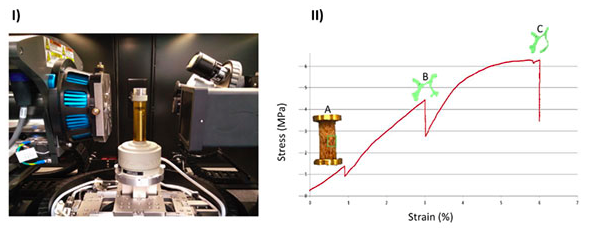Members Login

Channels
Special Offers & Promotions
The Zeiss Global Centre in the School of Engineering at the University of Portsmouth uses Deben
Deben, a leading provider of in-situ testing stages together with innovative accessories and components for electron microscopy, reports on how the new Zeiss Global Centre at the University of Portsmouth will use Deben’s mechanical stages for in situ µXCT studies of the structural competence of biological structures.
The Zeiss Global Centre (ZGC) is a strategic collaboration between the School of Engineering at the University of Portsmouth and Carl Zeiss Ltd. The Centre is directed by Professor Asa Barber (bio-inspired engineering) and Dr Gianluca Tozzi (healthcare applications). They will lead research into the structural competence of biological structures, biomaterials and bio-inspired engineering materials, through advanced X-ray microscopy. The ZGC is equipped with the latest x-ray imaging and in-situ mechanical testing technology, as well as high-performance computing facilities and dedicated, licensed software for accurate post-processing and analysis of images.
Dr Tozzi describes his research and how he came to choose the µXCT stages from Deben: “Our aim is to produce world-leading research by combining high-resolution imaging, in situ mechanics and Digital Volume Correlation (DVC) to explore the behaviour of biological tissues and bio-inspired structures. The ZGC is equipped with two Zeiss systems for x-ray microscopy (Versa 520 and Versa 510), capable of hosting our Deben in situ mechanical stages: the CT5000 and CT500. These provide a clear interpretation of how the properties of materials change under different loading conditions, particularly when coupled with innovative techniques such as DVC.”
Environmental control is vital to the work of Dr Tozzi and his colleagues: “Our Deben loading stages are very versatile in terms of load capacity and in addition they provide the possibility to test our samples in simulated physiological environment (i.e. liquid chamber and temperature control). This is extremely important for our applications, as often we have to deal with biological tissue mechanics that requires appropriate environmental conditions. We were actually one of the first Universities in the country to adopt Deben rigs for our research. Our first 3kN custom-made loading stage (still in use) was commissioned in 2010 and we have recently taken delivery of our latest unit (CT500).”
The Deben Microtest CT tensile stages for µXCT systems allow samples to be examined using customised load cells in the range from 150 N up to 5000 N (5 kN). The compact design of these testing stages allow them to be used with the smallest high resolution µXCT systems providing a range of tensile and compression stages with forces up to 20 kN and resolutions down to 25 mN. Systems are controlled from the comprehensive MICROTEST tensile stage control software giving a wide range of control functions and a live display of load verses extension and supplied with all required cabling and mounting adaptors for users’ µXCT systems. Custom versions are available with Peltier heating & cooling from -20 °C to +160 °C, extended stroke and travel.
Media Partners



